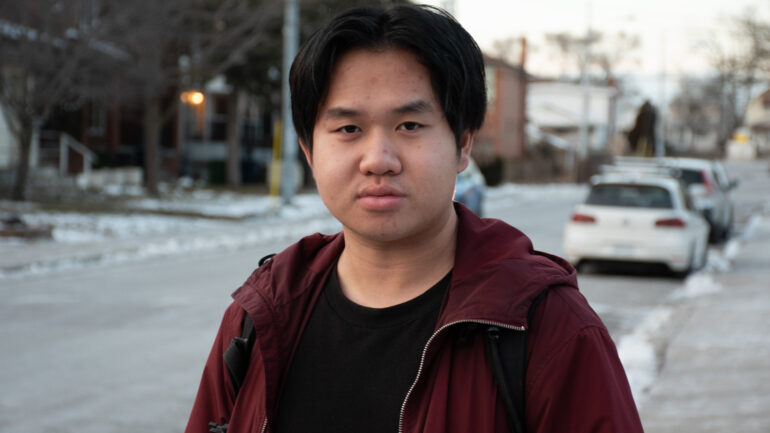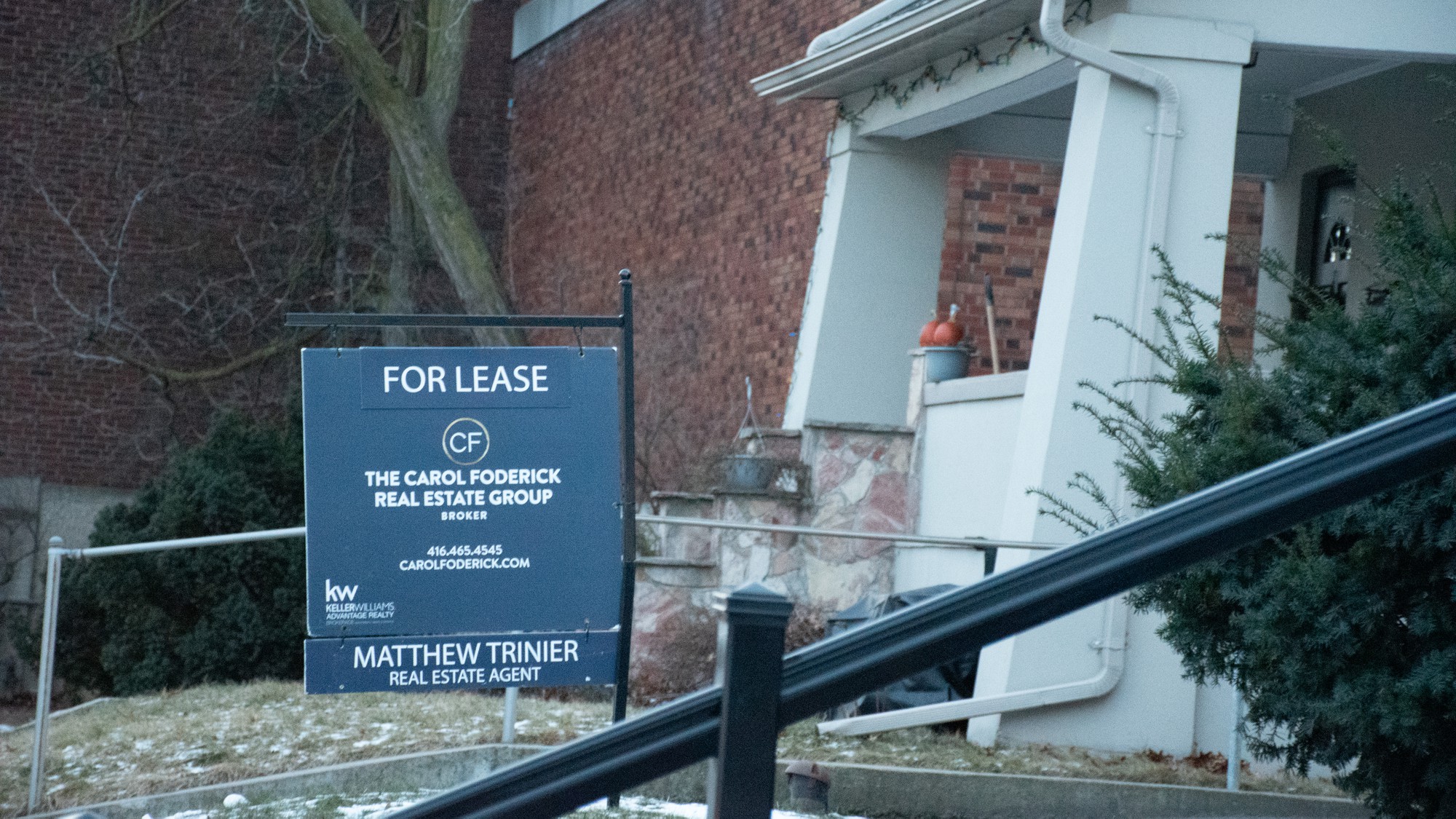A job used to help when food and rent prices went up while being a student. Unfortunately, that doesn’t seem to be the case for Humber student Evan Dallimore.
“Everything is so [far], especially inflation and in the housing market,” Dallimore said. “There’s nothing you can really do about it. You just got to deal with it.”
Dallimore, an Electrical Engineering Control Systems student at Humber, said he and his family pay about $900 per month on rent.
The guideline for rent increase in 2024 is 2.5 per cent for units built before 2018, according to the provincial government.
It’s the maximum amount a landlord can increase rent during a year without the approval of the Landlord and Tenant Board.
“You just need more money,” Dallimore said when asked how he could adapt to the rent increase.

Evan Dallimore, an Electrical Engineering Control Systems student at Humber. Dallimore is a tenant of an apartment and is affected by the rent increase. Photo credit: Krishna Bhagnathsingh
“You can’t really fight against it, so yeah, adapt towards it and kind of make decisions to be able to financially support that,” he said.
Dallimore said as he grows older, he’ll have to choose a field that offers better income to be able to keep affording rent.
“You’re definitely going to have to sacrifice a few wants over needs,” he said. “Like the food that you need is harder to buy, it’s just everything is dependant on what you can do.”

Kenny Vuong, a Police Foundations student at Humber. Vuong is a tenant of an apartment who is also affect by the rent increase guideline. Photo credit: Krishna Bhagnathsingh
Kenny Vuong, a Police Foundations student at Humber, also rents an apartment with his family and wonders how the rent increase will affect them.
“It’s a lot of money to consider, inflation is going up, among other personal issues,” Vuong said. “It’s pretty hard outside right now, rent is going up and if rent keeps going up, how can we pay it off?”
Vuong said he and his family pay about $1,000 a month for rent.
“It definitely impacts my family and me,” Vuong said. “The hard part is to multi-task with school and trying to help out with the rent.”
Vuong thinks the government should step in to address the issue and that they should focus on helping tenants who are struggling with the rent increase.
“It’s not just for me, but for everyone who is renting as well, it affects them too,” Vuong said. “They should have a program to help them with this issue or provide money to those who are struggling.”
He said job opportunities are getting harder, which makes it a struggle to pay rent.
Vuong said a rent increase would have a domino effect, making it harder to buy other essentials.
“I would definitely say less spending on items, but due to inflation, it’s hard to consider that,” he said.
Jessica Bell, an MPP and housing critic for the NDP who represents the University-Rosedale riding, said the rent increase limit shows the need for stronger rent controls.
Bell said a 2.5 per cent increase is significant “especially when we consider the rent is already at a record level and most Ontarian wages have not kept up with rent hikes.”
Bell said this is pushing renters to a breaking point and too many renters can’t afford to pay their bills because housing costs have gone through the roof.
“I think it’s driving a lot of the anger and the frustration that renters would feel towards our political leaders because they feel they are being left behind,” Bell said.
She said forcing millions of renters to pay even more for rent will make it even more difficult for people to live in our very expensive province.
A January 2024 report from Urbanation says a one-bedroom unit in Toronto commands an average of $2,521 per month.
In Mississauga, a one-bedroom unit averaged $2,371, while the same unit demanded $2,284 in North York. In Brampton, a one-bedroom unit averaged $2,117 a month.
These rental costs put these cities in the top 10 for most expensive rental units across Canada.
The average rent for a single bedroom in Canada soared 22 per cent in the past two years, including nine per cent last year.
Putting 2.5 per cent into context, Bell said the Ford government has raised the rent on rent-controlled apartments by the legally allowable maximum, under the Residential Tenancies Act.
“They are not allowed to raise it beyond unless they changed the law, they’re actually not allowed to raise it to 2.5 per cent,” Bell said.
“Currently new buildings are exempt, so maybe people move into a new building, built after 2018, and they get a surprise at the end of the year when their rent has gone up by $500 because they didn’t know they were not protected by rent control,” Bell said.
She would like to see a rent control system similar to what Quebec and Manitoba have done, which includes vacancy control.
“Many landlords illegally evict tenants because they want to bring in a higher paying tenant to make more profit,” Bell said.
“More people who live in Ontario can have better lives here because they’re going to have more disposable income,” she said.
Bell said many cost-cutting measures people are now making are because they can’t afford housing.
Rees Nam, a spokesperson with the Federation of Metro Tenants Association (FMTA), said the rent increase is not warranted.
“We don’t think the landlord should get these increases at all, just because they get these increases even if they don’t do anything,” Nam said.
“Oftentimes there are landlords who don’t do maintenance or repairs and yet they’re still allowed to get rent increases,” they said.
Nam said the FMTA gets a lot of calls on their tenant hotline and that the market rent in general is high.
“With any increases, it just becomes really hard for the tenant and things become unaffordable really quickly,” Nam said.
“Some tenants have to decide between food and rent and that’s a really hard decision to make, especially with the rising food cost as well,” they said.
“There’s a limit to rent control on newer buildings built after Nov. 15, 2018,” Nam said.
They said the organization’s goal is to primarily serve the city of Toronto by answering questions about tenant rights and providing information.
“The FMTA board tries to push for things [up] to city level as well, surrounding budgets and trying to get more funding for tenant rights,” Nam said.
“We usually feel that the government needs to [reinstate] rent control, as well as install vacancy control,” they said.
“Tenants feel pushed out of their rentals and that even if they leave, it’s hard to find anything affordable,” Nam said.
These rental units include rented houses, apartments, basement apartments and condos, and other living spaces such as care homes, mobile homes and land lease communities.
The Landlord and Tenant Board did not respond to multiple interview requests.

